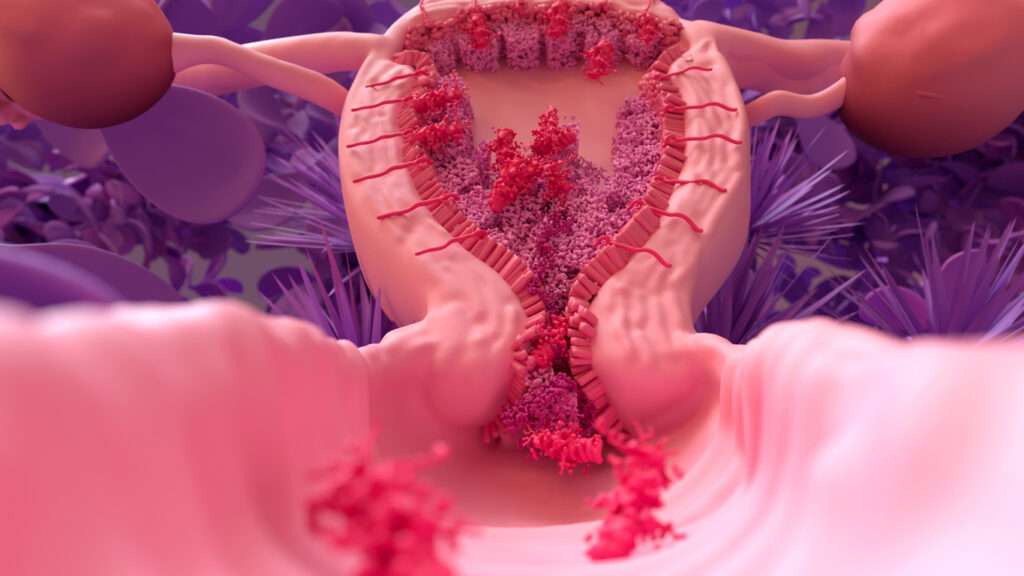Menstrual periods usually last four to seven days. Periods that are less than 21 days between or more than 35 days apart, missing three or more periods in a row, and menstrual flow that is substantially thicker or lighter than usual are all examples of menstrual disorders.
Keep on reading to find more information about irregular periods and their causes, as well as what you can do to prevent this from happening.
Menstrual Cycle & Normal Parameters
The monthly set of changes that a woman’s body goes through in preparation for the potential of pregnancy is known as the menstrual cycle. Ovulation is the release of an egg by one of the ovaries once a month. Hormonal changes prepare the uterus for pregnancy at the same time. If ovulation occurs but the egg is not fertilized, the uterine lining sheds via the vaginal opening, resulting in a monthly period.
Every woman’s menstrual cycle, which runs from the first day of one period to the first day of the next, is different. Menstrual flow can last anywhere from two to seven days and can occur every 21 to 35 days. Long cycles are frequent in the first several years after menstruation begins. Menstrual cycles, on the other hand, tend to shorten
and become more regular as you get older.
Your period can be light or heavy, painful or pain-free, long or short, and still, be considered normal if your menstrual cycle is regular and around the same duration every month. “Normal” refers to what is normal for you within a broad range. Keep in mind that certain methods of contraception, such as extended-cycle birth control tablets and intrauterine devices (IUDs), can cause your menstrual cycle to change. Your period may become irregular again as you approach menopause.
Causes Of Menstrual Irregularities
Menstrual cycle irregularities can be caused by a variety of factors, including:
● Breast-feeding or pregnancy. A missed period can be an indication of an impending pregnancy. Breast-feeding tends to postpone the onset of menstruation after pregnancy.
● Eating disorders, such as significant weight loss, or excessive exercise. Menstruation can be disrupted by eating disorders including anorexia nervosa, significant weight reduction, and excessive physical activity.
● Polycystic ovarian syndrome (PCOS). During an ultrasound test, women with this common endocrine system issue may have irregular periods as well as enlarged ovaries with tiny collections of fluid in each ovary.
● Ovarian failure that occurs too soon. The lack of normal ovarian function before the age of 40 is referred to as premature ovarian failure. For years, women with premature ovarian failure, also known as primary ovarian insufficiency, may experience irregular or infrequent periods.
● Inflammation of the pelvis (PID). Menstrual irregularities can be caused by this infection of the reproductive organs.
● Fibroids in the uterus. Uterine fibroids are noncancerous uterine growths. They can produce heavy menstrual cycles and menstrual periods that last a long time.
Preventing Menstrual Abnormalities
If your menstrual cycle has changed in any way, you should keep track of when your period starts and finishes, as well as the volume of blood flow and whether you pass large blood clots. Other symptoms to keep track of include bleeding between periods and menstrual cramps or pain.
Book a consultation with us to discuss your specific situation so a personalized treatment can be recommended for you. Her Down There strives for promoting accessible and quality health care services for all women, with accurate information and tests that can help you have a more balanced menstrual cycle.
Letrice Mason, MSN, APRN, FNP-C, is an accomplished women’s health nurse practitioner and proud owner of the esteemed Her Down There Women’s Clinic. She is a trusted healthcare professional within the Houston community.









